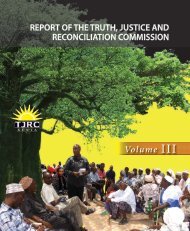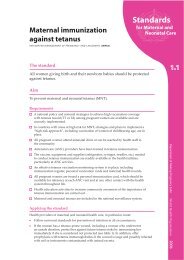1y0aYIa
1y0aYIa
1y0aYIa
Create successful ePaper yourself
Turn your PDF publications into a flip-book with our unique Google optimized e-Paper software.
were withdrawn; one was closed pending the arrest of a suspect; and one was “dismissed”(it was unclear whether this was an acquittal or a withdrawal). Five were pending beforethe courts as of November 2011. Only eight had resulted in convictions. These filesencompass the majority of serious crimes listed within the March 2011 Department ofPublic Prosecutions report, as well as several petty crimes, including stealing andincitement to violence. Human Rights Watch researchers consulted the case files andinterviewed lawyers, judges, police officers, and Kenyan civil society activists familiar withthe cases. Researchers also interviewed dozens of other victims whose cases stalled at thepolice investigations stage, never reaching the courts.Based on this research, Human Rights Watch has identified a number of across-the-boardweaknesses in Kenya’s policing and judicial systems that contributed to a low rate ofconvictions. These include poor police investigations, inaccurate or incompletequalification of charges, an ailing police prosecutorial system, and overburdened statecounsel. Other factors include interference by politicians, affecting police, prosecutors,and defense lawyers; judges’ errors in evaluating evidence; and the lack of a viablewitness protection system. In addition, the absence of adequate legal frameworks andexpertise to prosecute at least some of the post-election violence as “international” crimes(such as crimes against humanity), discussed below, may have been a factor in the limitednumber of cases targeting those who organized the violence.Many of these problems are not unique to the investigation and prosecution of postelectionviolence; they inhibit access to justice for a broad spectrum of crimes. Some ofthese issues are being addressed by a series of reforms driven by the National Accord andReconciliation Act and the new constitution, while others remain unaddressed.Poor Investigations by PolicePoor investigations were the principal explanation cited by interlocutors as to why postelectionviolence cases failed to advance.Problems with police investigations often began the moment that victims filed complaints.The Waki Commission heard shocking testimony such as: “In some cases police just toldcomplainants they should be grateful that they are alive and forget what happened.” 171Other victims, particularly of sexual violence, were turned away from police stations if theycould not identify the perpetrator by name. 172171 CIPEV, p. 394.172 CIPEV, p. 400.“TURNING PEBBLES” 46






